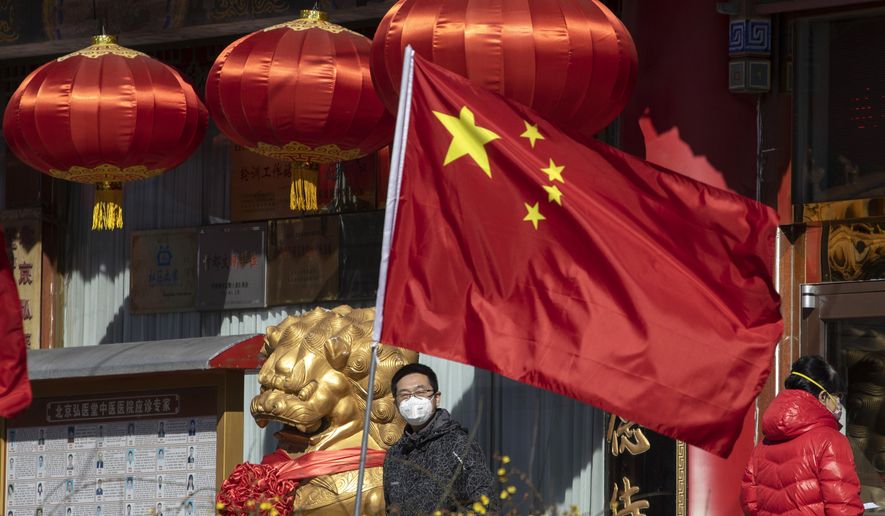The Democratic Party platform adopted at last week’s nominating convention dropped any reference to the U.S. policy of recognizing a single China in reference to unofficial American ally Taiwan.
The new platform issued for presidential nominee Joseph R. Biden on Thursday states that Democrats are committed to the 1979 Taiwan Relations Act, which calls upon the U.S. to defend Taiwan from mainland attack.
The platform then states that Democrats “will continue to support a peaceful resolution of cross-strait issues consistent with the wishes and best interests of the people of Taiwan.”
By contrast, the 2016 platform explicitly supported the “One China” policy hammered out in the 1970s, when the U.S. dropped formal diplomatic recognition of Taiwan and shifted recognition to Beijing. The 2016 document said Democrats were “committed to a ’One China’ policy.”
China’s Foreign Ministry criticized the platform change.
Asked about the change, Foreign Ministry Spokesman Zhao Lijian said the Taiwan issue “is the most important and sensitive issue between China and the U.S.”
“The One China principle is the political foundation of China-U.S. relations and a common consensus of the international community,” he said. “We urge relevant sides to abide by the One China principle and the three China-U.S. joint communiqus, and prudently and properly handle Taiwan-related issues.”
The mild criticism of the Democrats from the Chinese government, some analysts say, reflects Beijing’s interest in seeing Mr. Biden defeat President Trump in November’s election.
Vice President Mike Pence has charged China with meddling in the U.S. election and said in a recent speech that Beijing “wants a different president.”
Chinese state media also warned the Democratic platform’s omission will worsen U.S.-China ties.
“The change of tone will likely further strain China-U.S. relations,” the Chinese Communist Party outlet Global Times states.
A Democratic National Committee spokesman did not respond to an email seeking comment on the platform change.
Taiwan is an independent island-state known as the Republic of China located about 100 miles from the Chinese coast. It was a refuge for Chinese Nationalist forces that fled from the mainland during the 1949 civil war that brought the communist regime to power.
The Trump administration has sharply increased ties to Taiwan, agreeing to a multibillion dollar F-16 aircraft deal, sailing warships repeatedly through the Taiwan Strait as a challenge to Beijing and earlier this month sending Health and Human Services Secretary Alex M. Azar II to the island.
In yet another sign of warming relations likely to anger Beijing, the U.S. envoy to Taiwan joined President Tsai Ing-wen at a military memorial service Sunday.
The director of the American Institute in Taiwan, William Brent Christensen and Ms. Tsai reportedly did not address the annual event for soldiers killed by Chinese bombing in 1958 on Kinmen, a Taiwanese-controlled island near the mainland coast.
The Democratic platform also takes a tougher tone on China than in the past but also calls for more moderate policies than Mr. Trump has pursued. It calls China’s trade practices unfair and criticizes its currency manipulation and technology theft.
“Democrats’ approach to China will be guided by America’s national interests and the interests of our allies, and draw on the sources of American strength — the openness of our society, the dynamism of our economy, and the power of our alliances to shape and enforce international norms that reflect our values,” the document said.
“Undermining those strengths will not make us ’tough on China.’ It would be a gift to the Chinese Communist Party,” the platform adds. The part promised to be “clear, strong, and consistent” in pressing China on differences over economic, security and human rights.
Defining the threat
Democrats argued that the threat from China is “not primarily” military, but are prepared to deter and respond to aggression.
“We will underscore our global commitment to freedom of navigation and resist the Chinese military’s intimidation in the South China Sea,” the document said.
China since 2012 has been building up disputed islands in the sea and in 2018 began deploying missiles and electronic warfare systems — in what U.S. officials say is a violation of a pledge made by President Xi Jinping not to militarize the islands.
The platform also states that a Democratic administration would support activists in Hong Kong with sanctions. It also condemned China’s placement of more than 1 million ethnic Uighurs and other minorities in “concentration camps.”
“Democrats will pursue this strategy without resorting to self-defeating, unilateral tariff wars or falling into the trap of a new Cold War,” the platform says. “Those mistakes would only serve to exaggerate China’s weight, over-militarize our policy, and hurt American workers.”
Secretary of State Mike Pompeo defended the U.S. hardline policy toward Taipei earlier this month.
Asked in an interview with One America News about Chinese threats against Taiwan, Mr. Pompeo said: “We thoroughly intend to uphold our obligations and commitments with respect to the historical understandings between the United States and China on Taiwan.”
The high-profile visit to Taiwan by Mr. Azar, a Cabinet secretary, was “wholly consistent with those commitments, and we’ve told both the Chinese and the Taiwanese that we are going to continue to abide by that set of understandings.”
During his visit to the island, Mr. Azar criticized the Beijing for mishandling the coronavirus outbreak that cases the current pandemic. Taiwan has been widely praised for its public health campaign to contain the virus spreading from the mainland.
“China could have — and should have — disclosed more information, more transparently, and more cooperatively regarding COVID-19,” he said. “They should have disclosed the rapid human-to-human transmission of the disease that they knew about. They should have disclosed the asymptomatic carriage and transmission of the disease.”
• Bill Gertz can be reached at bgertz@washingtontimes.com.




Please read our comment policy before commenting.